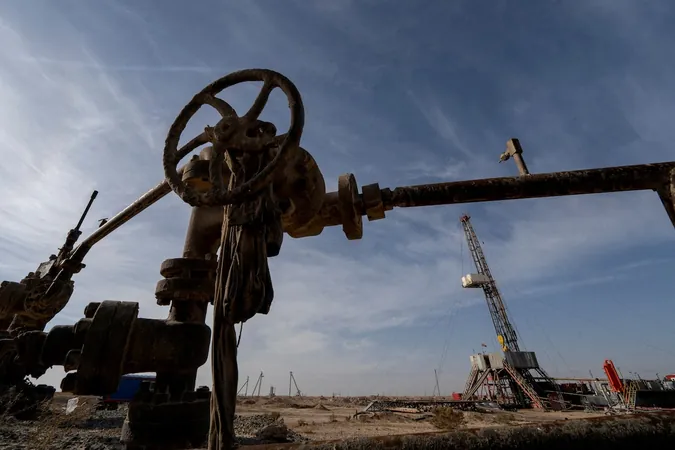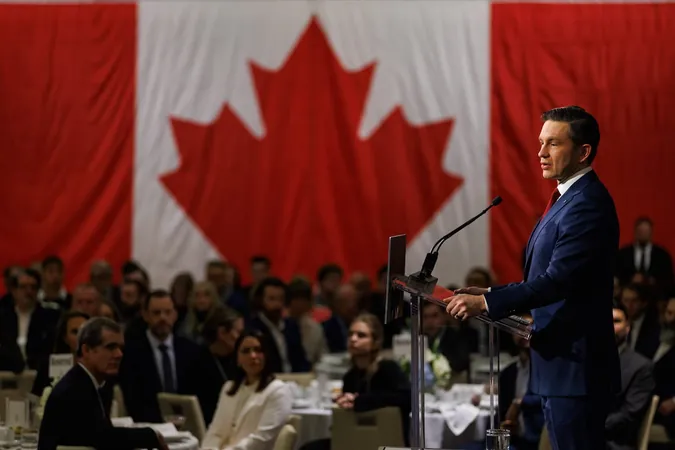
Trump's Tariffs: A Strategic Exemption for Oil and Gas That Could Shake Global Markets!
2025-04-03
Author: Noah
Trump's Tariffs Exclude Energy Commodities
In a surprising twist within the expansive new tariff framework set forth by U.S. President Donald Trump, it's noteworthy that energy commodities, particularly crude oil and natural gas, have been carved out from these sweeping measures.
Tariff Details and Energy Exemption
The administration has announced a baseline import tariff of 10% on a wide range of products coming into the United States, with even steeper tariffs imposed on key trading partners—20% on the European Union, 34% on China, 24% on Japan, and 26% on India. However, crucially, these tariffs do not apply to essential energy imports, a move designed to shield American consumers from potential gas price surges and align with Trump's ongoing goals to maintain affordable energy costs.
Global Commerce Implications
This exemption then raises broader complexities regarding global commerce, particularly how countries will strategize their responses to Trump's tumultuous approach to trade. Many nations view energy as a powerful bargaining chip; the United States stands as the world's foremost exporter of liquefied natural gas (LNG) and refined oil products, holding a notable position in global crude oil and coal markets as well.
Energy Imports as a Bargaining Chip
To stave off tariffs, several countries have explored increasing their energy imports from the U.S. But the blanket imposition of tariffs on various goods complicates such intentions, leaving nations reconsidering their options. Are they willing to risk diplomatic relations by leveraging energy trade in their negotiations with the Trump administration?
China vs. U.S. Energy Trade
Here’s where it gets intriguing: purchasing energy from the U.S. gives countries a substantial card in their diplomatic deck. For instance, while China has opted to impose its own tariffs on U.S. crude, LNG, and coal, impacting bilateral trade between the two largest economies, the repercussions on global energy prices have been minimal. China's role as a buyer of U.S. energy was relatively small, allowing the country to pursue alternative sources without significant disruption.
Europe's Dependency on U.S. Energy
In stark contrast, Europe, which relies on the U.S. for over half of its LNG, finds itself in a precarious position. The continent's heavy dependence on U.S. crude and refined products creates a scenario where cutting ties could spell disaster for regional stability and pricing in the energy sector. With such tight connections, European nations must tread carefully, pondering whether they might negotiate exemptions in a climate of hostility.
Japan and India as Potential Bargainers
Meanwhile, countries like Japan and India are likely to capitalize on their energy dealings as potential bargaining points with the Trump administration to carve out limited exemptions from the tariff regime.
Future of Global Trade Relationships
The uncertain nature of Trump's tactics leaves many global leaders speculating on whether their diplomatic overtures regarding energy will yield any favorable outcomes. However, a prevailing sentiment suggests that nations are likely to diversify their trade relationships, diminishing their reliance on the U.S. as their primary energy partner.
Conclusion: The New Global Trade Landscape
In the long run, the landscape has been irreversibly altered by these tariffs. The United States may find itself relegated to the role of a last-resort trading partner, with countries seeking alternatives to minimize their exposure to fluctuating U.S. trade policies. As tensions rise and negotiations unfold, the global trading system could be on the verge of a profound transformation—with energy trade standing at the crossroads of this shifting paradigm.
Watch for Evolving Impacts
Keep watching as we track the evolving impacts of these tariffs and their ripple effects across the global economy!









 Brasil (PT)
Brasil (PT)
 Canada (EN)
Canada (EN)
 Chile (ES)
Chile (ES)
 Česko (CS)
Česko (CS)
 대한민국 (KO)
대한민국 (KO)
 España (ES)
España (ES)
 France (FR)
France (FR)
 Hong Kong (EN)
Hong Kong (EN)
 Italia (IT)
Italia (IT)
 日本 (JA)
日本 (JA)
 Magyarország (HU)
Magyarország (HU)
 Norge (NO)
Norge (NO)
 Polska (PL)
Polska (PL)
 Schweiz (DE)
Schweiz (DE)
 Singapore (EN)
Singapore (EN)
 Sverige (SV)
Sverige (SV)
 Suomi (FI)
Suomi (FI)
 Türkiye (TR)
Türkiye (TR)
 الإمارات العربية المتحدة (AR)
الإمارات العربية المتحدة (AR)